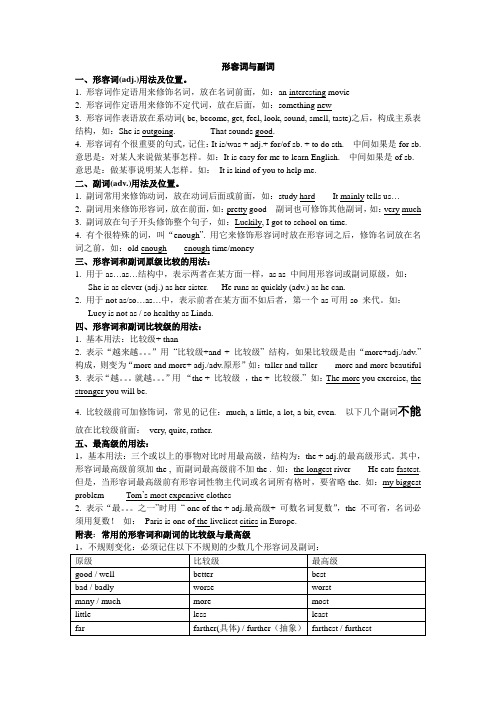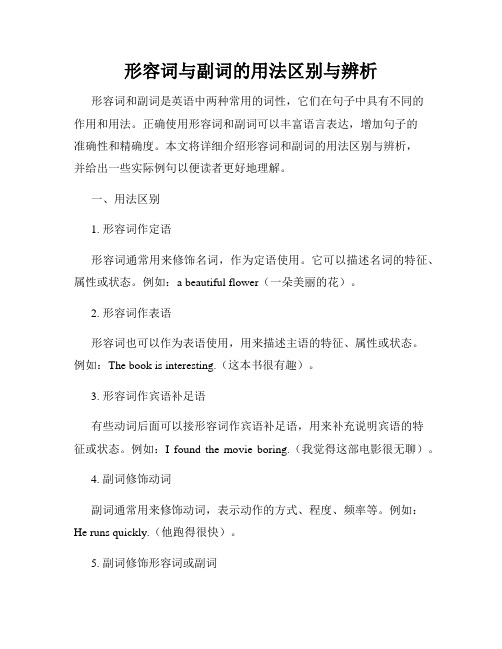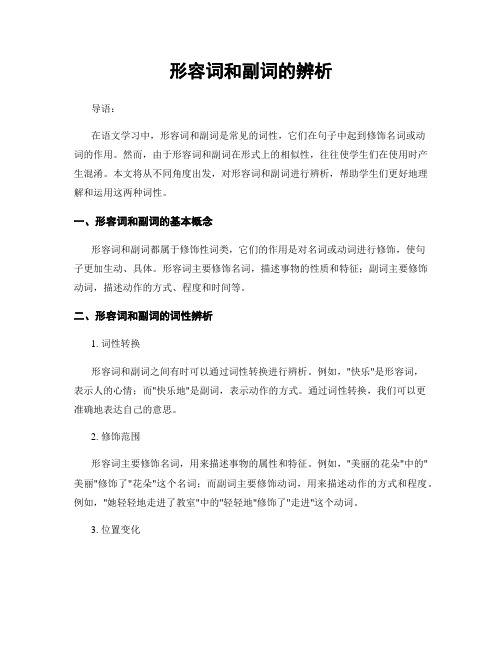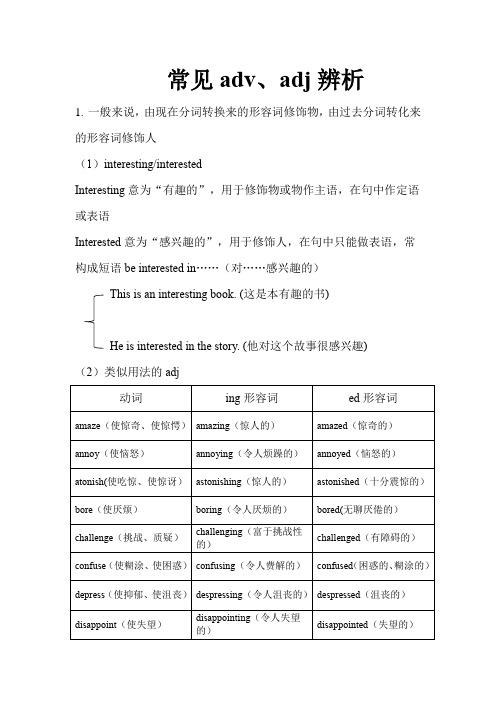形容词副词辨析
形容词与副词

形容词与副词一、形容词(adj.)用法及位置。
1. 形容词作定语用来修饰名词,放在名词前面,如:an interesting movie2. 形容词作定语用来修饰不定代词,放在后面,如:something new3. 形容词作表语放在系动词( be, become, get, feel, look, sound, smell, taste)之后,构成主系表结构,如:She is outgoing. That sounds good.4. 形容词有个很重要的句式,记住:It is/was + adj.+ for/of sb. + to do sth. 中间如果是for sb. 意思是:对某人来说做某事怎样。
如:It is easy for me to learn English. 中间如果是of sb. 意思是:做某事说明某人怎样。
如:It is kind of you to help me.二、副词(adv.)用法及位置。
1. 副词常用来修饰动词,放在动词后面或前面,如:study hard It mainly tells us…2. 副词用来修饰形容词,放在前面,如:pretty good 副词也可修饰其他副词,如:very much3. 副词放在句子开头修饰整个句子,如:Luckily, I got to school on time.4. 有个很特殊的词,叫“enough”. 用它来修饰形容词时放在形容词之后,修饰名词放在名词之前,如:old enough enough time/money三、形容词和副词原级比较的用法:1. 用于as…as…结构中,表示两者在某方面一样,as as 中间用形容词或副词原级,如:She is as clever (adj.) as her sister. He runs as quickly (adv.) as he can.2. 用于not as/so…as…中,表示前者在某方面不如后者,第一个as可用so 来代。
中考英语复习第一节 形容词和副词词义辨析

第一节形容词和副词词义辨析,河北五年中考命题规律及趋势考纲要求 1.形容词辨析2.副词辨析3.混合辨析考查点年份题号选项设置分值形容词词义辨析201942 different/similar/large/small 1分201828 clever/brave/funny/careful 1分39 wide/safe/smooth/thick 1分42 hopeful/comfortable/valuable/successful 1分201728 patient/lucky/possible/traditional1分40 lazy/noisy/hungry/sleepy 1分44 helpful/harmful/peaceful/painful1分201631 sweet/lucky/strange/funny 1分46 bored/tired/hungry/thirsty 1分201530 thankful/careful/useful/helpful 1分41 heavy/full/much/long 1分78 a sleep1分副词词义辨析201935 still/always/already/almost1分38 Easily/Finally/Safely/Quickly 1分201743 quietly/proudly/politely/suddenly1分201643 busily/quickly/bravely/suddenly 1分201533 mainly/really/possibly/hardly 1分形容词、副词转换201979 deeply(deep) 1分201874 happily(happy) 1分201774 carefully(careful) 1分201678 easily(easy) 1分201577 safely(safe) 1分河北中考单项选择、完形填空主要涉及形容词和副词的词义辨析,且侧重在语境中的运用,而且更多的为形容词词义的辨析。
形容词与副词的用法区别与辨析

形容词与副词的用法区别与辨析形容词和副词是英语中两种常用的词性,它们在句子中具有不同的作用和用法。
正确使用形容词和副词可以丰富语言表达,增加句子的准确性和精确度。
本文将详细介绍形容词和副词的用法区别与辨析,并给出一些实际例句以便读者更好地理解。
一、用法区别1. 形容词作定语形容词通常用来修饰名词,作为定语使用。
它可以描述名词的特征、属性或状态。
例如:a beautiful flower(一朵美丽的花)。
2. 形容词作表语形容词也可以作为表语使用,用来描述主语的特征、属性或状态。
例如:The book is interesting.(这本书很有趣)。
3. 形容词作宾语补足语有些动词后面可以接形容词作宾语补足语,用来补充说明宾语的特征或状态。
例如:I found the movie boring.(我觉得这部电影很无聊)。
4. 副词修饰动词副词通常用来修饰动词,表示动作的方式、程度、频率等。
例如:He runs quickly.(他跑得很快)。
5. 副词修饰形容词或副词副词也可以用来修饰形容词或副词,表示程度或程度的比较。
例如:She is very beautiful.(她非常漂亮)。
6. 副词作状语副词可以作状语,修饰整个句子或者句子中的某一部分,表示时间、地点、方式、原因、目的等。
例如:He speaks English fluently.(他英语说得很流利)。
二、用法辨析1. 形容词和副词的形式不同形容词和副词的形式有所不同,在大多数情况下,形容词以-y结尾的单词变为副词时,将-y改为-i再加-ly。
例如:happy(形容词)→ happily(副词)。
2. 形容词描述名词,副词描述动词形容词通常用来描述名词,表示名词的性质、状态等;而副词主要用于修饰动词,表示动作的方式、程度、频率等。
3. 形容词有属格和比较级形式,副词没有形容词可以使用属格形式和比较级形式,用来表示所有关系和比较程度。
例如:John's house(约翰的房子)、more beautiful(更美丽)。
副词与形容词的区别

副词与形容词的区别副词与形容词的区别(1)形容词可以以同样的意义做谓语,可以再加程度副词,有时还可做补语,副词不能。
如:A事情的发生很偶然?B这件事发生得太突然了。
"A中的"偶然"不能换成"偶尔"。
B中的"突然"不能换成"忽然"。
可见,"偶尔"、"忽然"是副词,"偶然"、"突然"·是形容词。
(2)形容词还可以以同样的意义修饰各词,副词不能。
例:c·突然事件,d·必然结果。
其中的"突然"不能换成"忽然","必然"不能换成“必定”或“必须”等。
(3)“白、老、净、怪、偏、直、硬”等,虽然既可做谓语义可做定语,也可做状语,但它们做谓语或定语时同做状语时,不能保持意义上的一致,试比较:“白的墙”和“白跑一趟”,“黄瓜老了”和“他老跑北京”,“道路很直”和“眼皮直跳”。
不难看出,每组词语中的两个“白”或两个“老”、“直”等,在意义上毫无联系,它们只是采用了同样的语音形式和书写形式而已,可见,放在动词和形容词前的“白、老、净、怪、偏、直、硬”等是副词。
副词和动词的区别(1)副词只做状语,而能做状语的动词还能做谓语并且意义不变。
如:“他连续工作了十小时”,其中的“连续”只做状语,而“继续”一词在“他们继续赶路”一句中做状语,在“你来继续我们的事业”一句中则做谓语(述语中心语),可见“继续”是动词。
(2)“没有”和“没”比较特殊,它们在动词和形容词前是副词做状语,否定行为、性状的发生,如“没有去”、“没有红”,“没去”、“没红”;在名词前是动词,带宾语,否定事物的存在或否定事物的领有,如“没有书”、“没书”。
副词与时间名词的区别时间名词可以做主语,还可以同介词组合成介词短语(词组),如“从前是什么样子?”“在过去”、“从过去到现在”。
形容词和副词的辨析

形容词和副词的辨析导语:在语文学习中,形容词和副词是常见的词性,它们在句子中起到修饰名词或动词的作用。
然而,由于形容词和副词在形式上的相似性,往往使学生们在使用时产生混淆。
本文将从不同角度出发,对形容词和副词进行辨析,帮助学生们更好地理解和运用这两种词性。
一、形容词和副词的基本概念形容词和副词都属于修饰性词类,它们的作用是对名词或动词进行修饰,使句子更加生动、具体。
形容词主要修饰名词,描述事物的性质和特征;副词主要修饰动词,描述动作的方式、程度和时间等。
二、形容词和副词的词性辨析1. 词性转换形容词和副词之间有时可以通过词性转换进行辨析。
例如,"快乐"是形容词,表示人的心情;而"快乐地"是副词,表示动作的方式。
通过词性转换,我们可以更准确地表达自己的意思。
2. 修饰范围形容词主要修饰名词,用来描述事物的属性和特征。
例如,"美丽的花朵"中的"美丽"修饰了"花朵"这个名词;而副词主要修饰动词,用来描述动作的方式和程度。
例如,"她轻轻地走进了教室"中的"轻轻地"修饰了"走进"这个动词。
3. 位置变化形容词通常位于名词前面,修饰名词。
例如,"大树"中的"大"修饰了"树"这个名词;而副词通常位于动词后面,修饰动词。
例如,"他慢慢地走过去"中的"慢慢地"修饰了"走"这个动词。
4. 语境判断在一些特定的语境中,我们可以通过判断修饰的对象来辨析形容词和副词。
例如,"他跑得快"中的"快"修饰了"跑"这个动词,表示动作的速度;而"他是一个快人"中的"快"修饰了"人"这个名词,表示人的性格特点。
常见形容词副词辨析

常见adv、adj辨析1.一般来说,由现在分词转换来的形容词修饰物,由过去分词转化来的形容词修饰人(1)interesting/interestedInteresting意为“有趣的”,用于修饰物或物作主语,在句中作定语或表语Interested意为“感兴趣的”,用于修饰人,在句中只能做表语,常构成短语be interested in……(对……感兴趣的)This is an interesting book. (这是本有趣的书)He is interested in the story. (他对这个故事很感兴趣)(2)类似用法的adj2.常见形容词、副词辨析(1)alone、lonelyAlone:独自的(地)、单独的(地),强调无人陪伴,既为形容词又为副词。
只能作表语(alone做副词时可以做状语)。
Lonely:“孤独的、寂寞的”含有感情色彩,为形容词。
可做定语或表语。
He lives alone,but he doesn’t feel lonely.This is a lonely island.作定语,“荒凉的、偏僻的”She is alone at home.(她独自一人在家。
)(2)asleep、sleepy、sleepingasleep/sleeping意为睡着的,asleep只能作表语,构成fall asleep(睡着);sleeping可作表语、定语,另外,还为动名词。
sleepy“困倦的、想睡的”可作表语、定语,构成feel sleep(感觉困倦)。
When my mother came home last night,I was asleep.Who is the sleeping man.I felt sleepy all day.(3)living、alive、lively、liveA.alive意思是“活着的、有生命的”一般作表语或后置定语,多用于修饰人;living意思是“活着的、健在的”可作表语和前置定语。
形容词和副词辨析-中考英语复习复习考点

命题趋势:形容词是描述人或事物的特征、性质、属性及状态的一种词类,主要用来修饰名词或代词。
对于形容词的考查多集中在三个方面:1. 形容词的比较等级;2. 形容词词义辨析;3. 形容词短语搭配。
纵观近年各地市中考题,对在语言环境中考查形容词词义的题目有逐步增加的趋势。
在学习过程中,要在识记形容词词义上多下功夫,同时兼顾比较等级的各种变化形式。
副词是历年各省市中考必考知识点。
从考查形式看,一般有单项选择、完形填空、词语运用等。
所占分值通常为2~4分。
从命题意图看,侧重考查考生的具体语言环境中使用副词的能力。
中考考查重点:一、形容词词义辨析;二、形容词短语搭配;三、副词的基本用法;四、副词的分类;五、易混淆的副词用法辨析等。
考向一:形容词的分类分类说明性质形容词用于表示人或物所具有的性质。
在英语中,大量的形容词属于这一类别,多数有比较级和最高级,有程度大小的区别,可以使用程度副词修饰。
funny滑稽的,lovely可爱的,healthy健康的类别形容词用于阐明人或事物所属的特定类别。
这一类形容词往往没有程度大小的区别、没有比较级和最高级,而且不使用程度副词修饰。
financial经济的,mental脑力的,cultural文化的颜色形容词用于表示事物颜色的形容词。
这一类形容词没有比较级和最高级。
blue蓝色的,green绿色的,white白色的叙述形容词这类形容词只能作表语,所以又称为表语形容词。
这类形容词没有级的变化,也不可用程度副词修饰,大多数以a开头的形容词都属于这一类。
afraid害怕的,alone单独的,asleep睡着的,worth值得的,ill病的考向二:形容词的句法功能Keep all the windows _____________, it’s too hot in the room.A. openedB. openC. closed【标准答案】B【答案剖析】由后半句可知房间里很热,故应该是打开窗户,此处应该用形容词open构成keep sth+adj.结构。
形容词和副词辨析

形容词和副词辨析形容词和副词是英语中常用的词性,它们在句子中分别用于修饰名词和动词。
然而,有时候我们会分不清形容词和副词的用法。
本文将重点介绍形容词和副词的区别,并提供一些常见的形容词和副词的用法和辨析。
一、形容词形容词是用来描述名词的词性,它用于修饰名词,常放在名词前面。
形容词可以表示物体的颜色、大小、形状、性质等。
例如:1. She has a beautiful house.(她有一栋漂亮的房子。
)2. The red apple looks delicious.(这个红苹果看起来很好吃。
)3. They live in a big city.(他们住在一个大城市。
)二、副词副词是用来修饰动词、形容词、副词或整个句子的词性,它可以表示程度、时间、地点等。
副词常放在动词或形容词之后。
例如:1. She sings beautifully.(她唱得很美。
)2. He drives slowly.(他开车慢慢地。
)3. They arrived early.(他们到达得很早。
)三、形容词和副词的区别1. 修饰名词和动词的不同形容词修饰名词,用来描述名词的性质、状态、特征等。
而副词修饰动词,用来描述动作的方式、程度、时间等。
例句:- It's a beautiful flower.(这是一朵美丽的花。
)(形容词)- She sings beautifully.(她唱得很美。
)(副词)2. 位置不同形容词通常位于名词之前,而副词通常位于动词之后。
例句:- The red apple looks delicious.(这个红苹果看起来很好吃。
)(形容词)- She sings beautifully.(她唱得很美。
)(副词)3. 词性不同形容词是描述名词的词性,而副词是描述动词、形容词或副词的词性。
例句:- She is a good student.(她是一个好学生。
)(形容词)- He runs quickly.(他跑得很快。
- 1、下载文档前请自行甄别文档内容的完整性,平台不提供额外的编辑、内容补充、找答案等附加服务。
- 2、"仅部分预览"的文档,不可在线预览部分如存在完整性等问题,可反馈申请退款(可完整预览的文档不适用该条件!)。
- 3、如文档侵犯您的权益,请联系客服反馈,我们会尽快为您处理(人工客服工作时间:9:00-18:30)。
形容词副词辨析————————————————————————————————作者:————————————————————————————————日期:一. 选择题1. —_________have you been learn English. —I have been learning English for six years.A. How longB. How oftenC. How far2. --______can you be ready, Andy? --In ten minutes.A How muchB How oftenC How longD How soon3. —______yogurt ['jɒgət]酸乳酪do you need? —Three cups.A. How longB. How farC. How manyD. How much4. —_____can we board(登上)our plane? —In twenty minutes.A. How longB. How farC. How soonD. How often5. —Xiao Wang, _____will it take to fly to Guangzhou? —Sorry, I do not know.A. how farB. how soonC. how manyD. how long6.【2013天水】131. —______ do you hold a sports meeting in your school? —Once a year.A. How oftenB. How farC. How longD. How soon7.【2013吉林】105. —_______ is it from here to the museum? — About 2 kilometers.A. How longB. How farC. How many8.【2013衢州】101. —_______can you tell whether a foreigner is English or American?—Maybe by the way he speaks.A. WhyB. WhenC. WhereD. How9. 【2013济南】100. —Jenny, I need some milk. —OK, Mum. ___________ do you need?A. How muchB. How manyC. How oftenD. How long10.【2013哈尔滨】97. —How wonderfully you are playing the piano! ___ do you practice it a week?—Twice. Practice makes perfect.A. How oftenB. How many timesC. How soon11. 【2013上海】99. —_______ have you been in the sports club? —Since the first month I came to the school.A. How oldB. How longC. How muchD. How soon12. ---_____does your cousin usually go to work on foot? --He says it’s good for his health.A. WhereB. WhenC. WhyD. How13. ---Why do people there _____use umbrellas in the sun?---Because they would rather enjoy the sunshine.A. hardlyB. oftenC. sometimesD. always14. If you want to get on well with your classmates, you’d better not think too much about yourself, because aselfless child is popular ________.A. somewhereB. everywhereC. where15. ---Sorry, sir. I can’t hear you cle arly. Can you say it ______? ---OK, I will say it again.A. quicklyB. slowlyC. hardlyD. slow16. ---How often do you go skating? ---______. I can’t skate at all.A. AlwaysB. SometimesC. SeldomD. Never17. Teenagers should be encouraged to go ______and be close to nature.A. insideB. backC. outsideD. off18.【2013安徽】83. —Tony,__________________ are you in such a hurry?—The meeting will start soon. I don’t want to be late.A. whereB. howC. whenD. why19. I love Xiamen, ______the weather here. It is neither too hot nor too cold all year.A. usuallyB. speciallyC. especially20. You can ______be a good teacher unless you become more patient.A. oftenB. everC. alwaysD. never21. My old neighbor Charles felt ______after his children moved out.A. lonelyB. safelyC. angrilyD. happily22. ---How do you like the scarf? ---Very much. It feels _____.A. hardB. sweetC. coolD. soft23. Don’t drink t he soup. It smells ______.A. niceB. deliciousC. saltyD. terrible24.(2011福州)--We all like Miss Wang. --I agree with you. She always makes her English class ______.A. interestedB. interestC. interesting25. (2011湖州) Sally used to be ______ , but now she enjoys meeting and talking to new friends.A. activeB. shyC. honestD. outgoing26. ---The girls are talking about the art festival _______.---Yes. They have so many fun things to share.A. easilyB. angrilyC. sadlyD. happily27. --- Mum, the Chinese medicine tastes so ______ that I don’t want to take it.--- But, dear, it is good for you.A. goodB. terriblyC. terribleD. well28. The flower smells ______and I like it very much.A. wellB. goodC. badD. badly29.【2011杭州)】A smiles costs nothing, but gives so ______.A. littleB. fewC. manyD. much30.【2013无锡】31.We arrived at the station too early and had ____to go, so we sat there and chatted with each other.A. somewhereB. anywhereC. everywhereD. nowhere二.填空题A. (how long, how often, how soon, how far)1. ---____________ have you been in China? ---For three years.2. ---_____________will he come back? ---In five minutes.3. ---______________ do you visit you grandparents? ----Once a week.4. --- ________________ should I throw it? --Five meters.5. -- ___________did you stay there? -For a week.6. -- ______________ do his parents let him watch TV? -Three times a week.7. -- ________________ will her husband come? --In two days.8. -- _______________ is it from you home to your school? --About two kilometers.9. -- _______________ shall we know the results? -- I don’t know.10. -- _______________ is the river? -- About 500 km.B. (also, too, either, as well)1. A:I’m tired.B:Me _______.2. She is young and beautiful, and ______ rich.3. –I don’t know her name.-I don’t know, ______.4. He didn’t buy a computer, and she didn’t ______.5. I know Japanese____________.= I know Japanese, ____________.6. You need to go shopping and I need to go shopping, _______.=You need to go shopping and I _______ need to go shopping.=You need to go shopping and I need to go shopping _________.7. You don’t know the way and I don’t know it, _________.C. (some time某段时间, sometime某个时候, sometimes有时, some times几倍)1. Would you come to the cinema with me___________?2. I ___________ receive letters from him.3. We plan to stay in Hainan for ___________.4. I'm sorry to trouble you, but I wondered if we could have a word _____________.5. It took me _____________ to digest(消化) what I had heard.6. I hope to see you again _____________ next year.7. I’m sure we have met ____________ before.D. (much too“非常……”, too much“太多,过分”)1. It is ____________ cold today.2. But where there is ____________ of it, the poisonous may do great harm to the things around us.3. She was afraid the trip would be ____________ for me.4. You are ____________ kind to me.5. He has done ____________ for his age.6. Tom drank ____________ wine yesterday evening.E. (alone “单独的,独自的”;“独自地”;lonely“孤独的,寂寞的,荒凉的”)1. The man lives_________ in a __________ house, but he doesn’t feel ________.2. He has few friends here, so he is _________.F. (ill, sick生病的) 都可做表语;但做定语时,ill是”坏的”;1. He is sick.=He is _______.=He is a ______ man.2. He is a bad man.= He is a ______ man.3. This is a _______ boy. Please take a seat for him.4. He has been _______ in bed for 2 days.G. (asleep作表语;sleepy作表语“困倦的”、“想睡觉的”;作定语“贪睡、寂静的”;sleeping作定语)1. She was fast _______; I couldn't wake her up.2. The old man has fallen _______.3. Keep an eye on the _______ baby.4. The children feel _______; put them to bed.5. Here are the outskirts/suburbs of Kowloon (九龙). Do you like this _________ valley?H. (dead死了的;dying将死的)1. The dog has _________(die). It has been _________ for an hour.2. His _________(die) made us sad.3. The bird is ___________. Let’s try to save it.K. (good a.好的, well a. 身体健康的;adv. 好地;n. 井)1. He is a ________ player. He plays basketball very _________.2. I’m not feeling __________ today. I must see a doctor.3. I had to fetch water from the __________ during those old days.L. (-ed形容词,表“感到…的”;-ing形容词,表“令人…的”)1. This film seems _______________(interested; interesting). It _____________(interest) me. I want to see ittomorrow.2. My brother has many _____________(interest). He is _______________(interested; interesting) in basketballmost.3. The film is so ________________(excited; exciting) that everyone felt ________________(excited; exciting)after we came out of the cinema.4. We’re all _______________(pleased; pleasant) with the news.5. -Thank you for your _______________(pleased; pleasant) dinner! –It’s my pleasure.6. What _____________(surprised; surprising) news! He was still alive. We all were _____________(surprised;surprising) at this.M. (hard a.困难的,硬的;adv.努力地)1. He can _____________(hard; hardly) see the blackboard, can he?2. It’s raining _____________(hard; hardly) outside. We can _____________(hard; hardly) walk in the rain.N. (else; other)1. What ________ do you want to say? = What ________ things do you want to say?2. Would you like anything _____________?3. He is taller than _____________ students in his class?。
